ORIF of Hip Fracture
Medically reviewed by Drugs.com. Last updated on Aug 4, 2025.
AMBULATORY CARE:
What you need to know about open reduction and internal fixation (ORIF) of a hip fracture:
ORIF is surgery to fix a broken bone in your hip. A hip fracture is a break in the top of the femur or in the hip socket. The femur is the long bone in your thigh that attaches to your pelvis at the hip joint. Open reduction means the broken parts will be moved back into the right position. Internal fixation means the broken parts will be held together with hardware, such as screws or plates. You may also need an implant to replace your hip socket. ORIF of a hip fracture is also called percutaneous hip pinning.
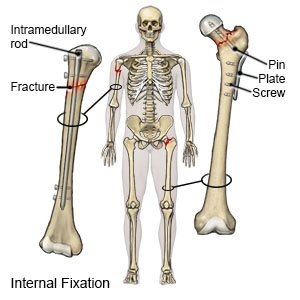 |
How to prepare for surgery:
- Your surgeon will tell you how to prepare for surgery. He or she may tell you not to eat or drink anything after midnight on the day of surgery. Arrange to have someone drive you home when you are discharged.
- Tell your surgeon about all medicines you currently take. He or she will tell you if you need to stop any medicine before surgery, and when to stop. He or she will tell you which medicines to take or not take on the day of surgery.
- You may need blood or urine tests before your surgery. You may also need x-rays, or an MRI of your hip. Do not enter the MRI room with anything metal. Metal can cause serious injury. Tell the provider if you have any metal in or on your body.
What will happen during surgery:
- You may be given medicine to keep you asleep and free from pain during surgery. You may instead be given the medicine into your spine to numb the surgery area. You may also be given antibiotics to prevent infection. Your healthcare provider will make an incision on your hip to see the damaged femur. He or she will straighten your femur and put the broken pieces of bone together. He or she will use metal screws, bars, plates, or rods to hold the broken bones tightly together.
- Your surgeon will use an artificial implant to replace the head of your femur, if needed. It will be tightly fitted to the top of your femur. It may be secured with screws or cement. If your hip socket is badly damaged, it may also be replaced with an implant. X-rays may be taken during surgery to help your surgeon put your hip joint back together. X-rays can also show if the devices and implants are in the right places. A drain may be placed to carry blood and other fluids away from your hip joint. Your incision will be closed with stitches or staples and covered with a bandage.
What to expect after surgery:
- You will stay in the hospital for several days. You will need to wear pressure stockings to help prevent blood clots. It will be important for you to get up and move after your surgery. Movement also helps prevent blood clots and pneumonia.
- A physical therapist will come and help you move the day after surgery. He or she will teach you how to use a walker or crutches. He or she will also give you exercises to do when you go home. After you go home, you will need to continue physical therapy.
Risks of ORIF of a hip fracture:
You may develop a life-threatening blood clot. You may have trouble walking without a walker or cane even after surgery. You may develop arthritis (joint inflammation) in your hip. Nerves may be injured. Your bone may not heal well or heal fully. You may have a limp if one leg becomes shorter than the other.
Call your local emergency number (911 in the US) if:
- You have chest pain when you take a deep breath or cough.
- You suddenly feel lightheaded and short of breath.
- You cough up blood.
Seek care immediately if:
- Your leg feels warm, tender, and painful. It may look swollen and red.
- You fall.
- Blood soaks through your bandage.
- Your wound becomes swollen, red, or has pus coming out of it.
- Your incision comes apart.
Call your doctor or surgeon if:
- You have a fever of 100.5°F (38.1°C).
- You have questions or concerns about your condition or care.
Prevent deep vein thrombosis (DVT):
DVT is a condition that causes blood clots to form inside your blood vessels. This can happen after a major bone surgery. Ask your healthcare provider for more information about DVT. Your healthcare may have you wear pressure stockings to help blood flow and prevent clots. He or she will give you a prescription for the right stockings for you. Do not buy over-the-counter pressure stockings unless your healthcare provider says it is okay. The stockings may not fit correctly or may have elastic that can cut off your circulation. You will be told how long to wear these stockings.
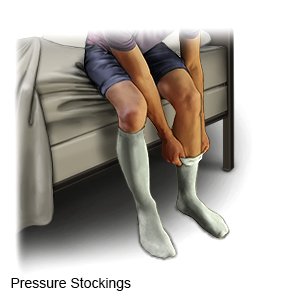 |
Wound care:
- Change the bandage as often as directed and when it gets wet or dirty. Check the surgery site for signs of infection, such as redness, swelling, or pus.
- Follow your healthcare provider's instructions on when you can bathe. Gently wash the part of your body that has the stitches. Do not rub on the stitches to dry your skin. Pat the area gently with a towel. When the area is dry, put on a clean, new bandage as directed.
Self-care:
- Rest as needed. Be careful and go slowly until you have healed. Stop if you have pain with activities. Try to avoid activities that increase your pain.
- Apply heat as directed. Heat increases blood flow and helps healing. Heat can also help decrease pain. You can apply heat with an electric heating pad, hot water bottle, or warm compress. Heat should be put applied for about 15 to 20 minutes up to 4 times a day and as directed. Always put a cloth between your skin and the heat pack to prevent burns.
- Apply ice as directed. Ice helps decrease swelling and pain. Apply ice for 10 to 15 minutes on your hip up to 4 times a day and as directed. Use an ice pack, or put crushed ice in a plastic bag. Cover it with a towel before you place it on your skin.
- Have more calcium and vitamin D, as directed. Calcium and vitamin D strengthen bones and can help prevent another fracture. Your healthcare provider may tell you to eat more dairy products, such as milk and cheese, for calcium. Spinach, salmon, and dried beans are also good sources of calcium. Cereal, bread, and orange juice may be fortified with vitamin D. You also get vitamin D from exposure to sunlight. Your healthcare provider may also suggest a calcium or vitamin D supplement. Do not take supplements unless directed. Eat high-protein foods to help your surgical wound heal, such as chicken, beef, fish, and pork. Also eat fruits and vegetables.
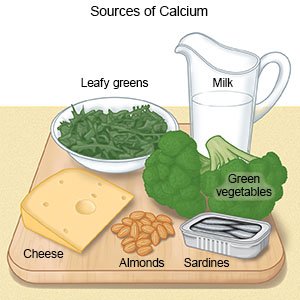

Go to physical therapy as directed:
A physical therapist will teach you exercises to help improve movement and strength of your hip. The therapist may suggest exercising in a pool. The exercises will also help to decrease pain.
Prevent falls:
Fall prevention is an important part of hip fracture recovery. The following may also help prevent another hip fracture:
- Get regular exercise. Exercise will improve your balance, range of motion, and strength. Ask about the best exercise plan for you.
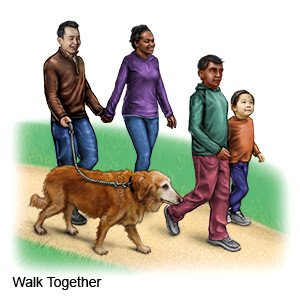
- Talk to your healthcare provider about all of the medicines you take. Some medicines can cause dizziness or drowsiness and increase your risk for falls.
- Use walking devices , such as canes or walkers, if you have trouble keeping your balance.
- Make your home safe:
- Improve the lighting in your home so that you can see well.
- Add grab bars to the inside and outside of your tub or shower and next to the toilet.
- Add railings to both sides of your stairways.
- Remove throw rugs and other objects that can cause you to trip and fall.
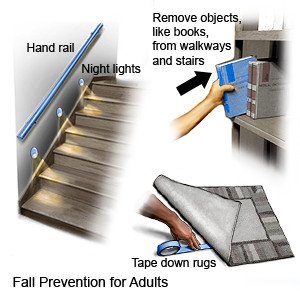
Follow up with your doctor or surgeon as directed:
You may need to return to have your wound checked and staples or stitches removed. You may need more tests or treatment. Write down your questions so you remember to ask them during your visits.
© Copyright Merative 2025 Information is for End User's use only and may not be sold, redistributed or otherwise used for commercial purposes.
The above information is an educational aid only. It is not intended as medical advice for individual conditions or treatments. Talk to your doctor, nurse or pharmacist before following any medical regimen to see if it is safe and effective for you.
Further information
Always consult your healthcare provider to ensure the information displayed on this page applies to your personal circumstances.
